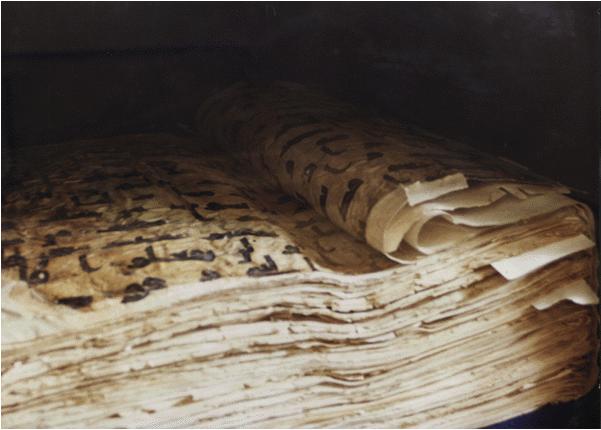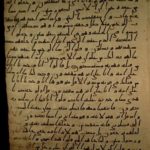
The word dīn does not mean religion or belief or doctrine but is a word whose origin goes back to Hebrew and Syriac as well as to Arabic. Dīn in its linguistic sense means ‘governance’, ‘the judiciary’, ‘justice’. Mālik yawm al-dīn (‘Master of the Day of Dīn’) does not mean that Allah has a certain religion, belief or doctrine, but that Allah is the Owner of all governance, adjudication and justice, He is the judge of the Worlds on the Day of Reckoning, who judges the behaviour and the deeds of mankind on the Great Judgment Day, the Day of Just Reckoning of the good or evil deeds committed by mankind.
AS FOR THE WORD ‘ISLAM’, this denotes ‘perfection and completeness’ and the noun does not denote the religion of Islam brought by the Prophet Muḥammad. Muslims, however, used it metaphorically to express the doctrine that accompanied the call of Muḥammad’s prophethood. When the Qur’ān mentions the words ‘Islam’ and ‘Muslims’, this does not specifically mean the Islamic religion and the Sharī‘a introduced by Muḥammad. It means the attainment of ‘perfection and completeness’ in everything before God.
Islam is a word of Syriac origin (ܫܠܡ) and was pronounced shlem. The author of the Qur’ān borrowed many terms from the Syriac language which was predominant in the seventh century as the language of culture, science, correspondence and the speech of the people. He employed these terms in formulating the language of the Qur’ān. Even the word Qur’ān and Furqān are Syriac-Aramaic words. Those acquainted with these words in Syriac (ܩܪܝܢܐ qeryānā, ܦܘܪܩܢܐ purqānā ) understand what they mean.[i]
The term muslimūn denotes that they are ‘perfect men’ who are obedient before God and without defect
The Qur’ān denoted previous prophets by the term muslimūn, prophets like Adam, Abraham, Joseph, Moses, David, Solomon and the disciples of Jesus Christ. But this does not mean that they are ‘Muslims’ in the sense of Muḥammad’s Islam, his faith and his Sharī‘a as the Muslim shaykhs claim. Rather, the term muslimūn applied to them denotes that they are ‘perfect men’[ii] who are obedient before God and without defect. The Qur’ān features the following verse:
The same did Abraham enjoin upon his sons, and also Jacob, (saying): O my sons! Lo! Allah hath chosen for you the dīn; therefore die not save as men who have surrendered (unto Him).[iii]
Did Abraham then command his sons not to die unless they believed in the religion of Muḥammad’s Islam? Or did He command them to be perfect and without blemish before Allah?
In the passage in Sūrat al-Baqara 131:
When his Lord said unto him: “Aslim!” he said: “I have aslamtu to the Lord of the Worlds”
But here it was not intended that Abraham should enter the religion of Islam according to the Sharī‘a of Muḥammad, who had not yet been created. Rather, it was God’s command to Abraham to be perfect without defect. To which Abraham replied: Aslamtu ‘I have become muslim’, that is, I will be perfect without defect”. The clearest explanation for this is what the Book of Genesis says in the dialogue between God and the Prophet Abraham, for in Genesis 17:1: God says to Abraham:
I am the Almighty God; walk before me, and be thou perfect.
The word in the Hebrew text is תָמִֽים tamīm and means ‘complete’, ‘perfected’. In Aramaic the term would be שְׁלִיםshalīm [iv],and in Syriac ܡܫܠܡ mshalam which in Arabic is pronounced muslim. The word mushlam in Hebrew would mean ‘sound’, ‘complete’ and signify perfected[v]. The word Islam derives from the Hebrew mashlīm[vi] and indicates the concept of ‘integrity’ / ‘perfection’ / ‘completeness’ / ‘without defect’. This is no different from what God said to Abraham in the Qur’ān:
“Aslim!” he said: “I have aslamtu to the Lord of the Worlds”
The Prophet Yūsuf said:
Lord …Make me die muslim and join me with the good.[vii]
This means that Joseph asked his Lord to make him pass away while he was complete in morals and upright conduct, without blemish and with a full faith in God. He did not mean ‘die while he was following the religion of Muḥammad’s Islam’, which as yet did not exist. The word Islam in the Qur’ān does not refer to the religion advocated by Muḥammad.
It says in Sūrat Al-Baqara:
a cow not made submissive that she should plough the land, nor does she irrigate the tilth; sound (musallama), without a blemish in her.[viii]
At the beginning of writing down of the Qur’ān, the script in which the Qur’ān was written was without diacritical dots or vowel signs, and was read a cow …muslima (without a doubling of the middle letter ‘l’). Would it be thus correct to interpret it that the cow was a ‘Muslim’ or a believer in the religion of Muḥammad? Clearly the correct explanation is that the cow was ‘perfect and flawless’.
If God had wanted His servants to follow solely the religion of Muḥammad’s Islam, why did He bring about Judaism and Christianity as revealed by Him to the earlier prophets
The phrase Lo! religion with Allah is Islam[ix] means that the preferred dīn for God is to pursue perfection in morals, behaviour and good deeds. It does not mean exclusively the dīn of Muḥammadan Islam – this is a faulty interpretation by Muslim shaykhs who were biased towards Islam and the abolition of the previous religions of God, the religions which God Himself had prescribed to His earlier prophets.
If God had wanted His servants to follow solely the religion of Muḥammad’s Islam, why did He bring about Judaism and Christianity as revealed by Him to the earlier prophets in the texts of the Torah and the Gospel, or send numerous prophets and messengers? The Qur’ān in many of its verses indicates that the earlier prophets testified that they were muslimūn:
Were ye present when death came to Jacob, when he said unto his sons: What will ye worship after me? They said: We shall worship thy god, the god of thy fathers, Abraham and Ishmael and Isaac, One Allah, and unto Him we are muslimūn [Qur’ān II (al-Baqara), 133]
The disciples said: We will be Allah’s helpers. We believe in Allah, and bear thou witness that we are muslimūn [Qur’ān III (Āl ‘Imrān), 52]
And He commanded you not that ye should take the angels and the prophets for lords. Would He command you to disbelieve after ye were muslimūn? [Qur’ān III (Āl ‘Imrān), 80]
Say: We believe in that which hath been revealed unto us and revealed unto you; our Allah and your Allah is One, and to Him we are muslimūn [Qur’ān XXIX (al-‘Ankabūt), 46]
Did Adam, Moses, Joseph, the disciples of Christ, the sons of Jacob and the People of the Book follow the religion and Islam of Muḥammad and his Sharī‘a? Or did the Qur’ān mean that they had perfected their morals and their behaviour before Allah by their perfection (islām) and submission (taslīm) to Allah?
They thus distorted its meaning and held that the word ‘Islam’ means ‘surrender’ to God
After he had escaped drowning the Pharaoh exclaimed, according to the Qur’ān:
I believe that there is no god but He in Whom the children of Israel believe and I am of those who are muslimūn. [x]
Did Pharaoh declare his belief in the Islam of Muḥammad? Or did he repent and regret what he had done and vowed to be perfect by his Islam to the God of the children of Israel?
What most clearly clarifies the terms islam and muslimūn is this verse:
Shall We then treat those who are muslimūn as We treat the guilty? What aileth you? How foolishly ye judge! [xi]
Here the Qur’ān contraposes the word muslimūn with a word that is completely opposite to it, which is mujrimūn(‘criminals’). That is, are we to make those who are muslimūn (‘perfect’) in morals as criminals of bad morals? This expression has nothing to do with the religion of Islam, but rather with good morals and conduct. The Qur’ān does not mention the word islam or muslimūn in the sense of the current religion of Islam, the religion advocated by Muḥammad.

Suggested Reading
It would not be wrong to believe that the terms ‘Islam’ and ‘Muslim’ in the Qur’ān means the religion of Islam invented by the Abbasids, and the doctrine and Sharī‘a initiated by Muhammad. But islam in the Qur’ān denotes perfection and completeness, something which Arab jurists could not understand because it is Syriac in origin and they were ignorant of its meaning and interpretation. They thus distorted its meaning and interpreted it as they understood it and held that the word ‘Islam’ means ‘surrender’ to God.
It is therefore wrong and false to maintain that the ancient prophets said ‘we are muslimūn’ in the sense of the Islam of the Sharī‘a and the Muḥammadan creed. What they actually said was: ‘We have become perfect before God’.
[i] ܦܘܪܩܢܐ purqānā denotes ‘salvation’, ‘redemption’ – used by Christians in the context of ‘redemption through the Blood of Christ’ (ܕܡܐ ܕܦܘܪܩܢܐ ) ; ܩܪܝܢܐ qeryānā denotes ‘lecture’, ‘recitation’, reading’. (Ed).
[ii] The Syriac word ܡܫܠܡܢܐ mshalmānē denotes ‘the perfect ones’, ‘those who perfect’. (Ed).
[iii] Qur’ān II (al-Baqara), 132.
[iv] The Aramaic for the verse in the Targum Onqelos is אֲנָא אֵל שַׁדַּי פְּלַח קֳדָמַי וִהְוִי שְׁלִים, where the word for ‘perfect’ is שְׁלִים shlīm. The Septuagint has ἄμεμπτος ‘without defect’ (Ed).
[v] This could be the meaning of a passive hophal form of the Hebrew verb שָׁלֵם shālēm ‘to be complete, sound’, in its participial form מָשְׁלָם moshlām (Ed).
[vi] The hiphil form of the Hebrew verb shālēm is השְׁלִים hishlīm, with a present participial form מַשְׁלִים mashlīm (Ed).
[vii] Qur’ān XII (Yūsuf), 101.
[viii] Qur’ān II (al-Baqara), 71.
[ix] Qur’ān III (Āl ‘Imrān), 19.
[x] Qur’ān X (Yūnus), 90.
[xi] Qur’ān LXVIII (al-Qalam), 35-36.
